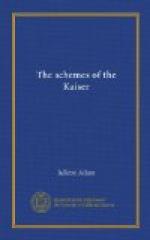“We know that for centuries the French nation’s protectorate has been established in Eastern Countries and that it has been confirmed by treaties between governments. Therefore no change whatsoever should be made in this matter. This nation’s protectorate, wherever it is exercised, should be religiously maintained and missionaries must be notified accordingly, so that, if they have need of help, they may have recourse to the Consuls and other agents of the French nation.”
At their last Congress the German Catholics—we know that the Catholics constitute a third of the population of Germany and that their representatives can hold in check the Imperial policy in the Reichstag—openly expressed their sympathy for Leo XIII, for the “noble exile at Rome, who is compelled, from the day of his elevation to the Papacy, to pledge himself never to cross the threshold of the Vatican alive.” When William II is compelled hereafter to make concessions to the Centre in the Reichstag, his allies, the Italians, will be well advised to give the matter their attention.
September 26, 1898. [11]
All the actions of that modern Lohengrin, William II, derive their inspiration from a Wagnerian theory concerning the harmony of discords. This friend of the Sultan, soon to be the guest of the Khedive, congratulates Kitchener, the Sirdar, whose deeds are the blood-stained consecration of England’s machinations in Mussulman territory.
Almost at the identical moment that he sent his telegram to the Sirdar to celebrate a British victory, he said at the opening of the new harbour at Stettin: “I rejoice that the ancient spirit of Pomerania is still alive in the present generation, urging it from the land towards the sea. Our future lies on the water.”
Queen of the Seas, take warning!
We know how William II is wont to express his pacific ideas and what is his conception of the reduction of armaments—with blustering threats and hosannahs in praise of rifles and cannons. On the subject of peace, the German mind has long since been fixed in its ideas. One cannot sum them up better than in the following quotation from a Berlin newspaper.
“At the Paris Salon in 1895 there was a great picture by Danger entitled ‘The Great Authors of Arbitration and Peace,’ depicting all those, from Confucius and Buddha down to the Tzar Alexander III, who have laboured in the cause of peace. In a note which explained the painter’s work, it was said to be impossible to depict all the friends of arbitration and peace. It seems to me that such friends of peace as William II and Prince Bismarck should not have been forgotten, for, by the Treaty of Frankfort, they have brought about a lasting peace and have obtained the power required to maintain it.”
Between this German conception of peace and ours, is there not a gulf that nothing can ever bridge?
October 23, 1898. [12]




